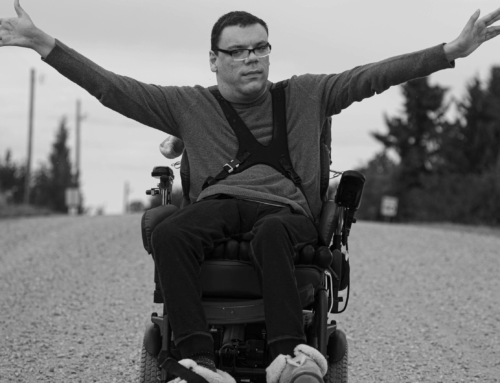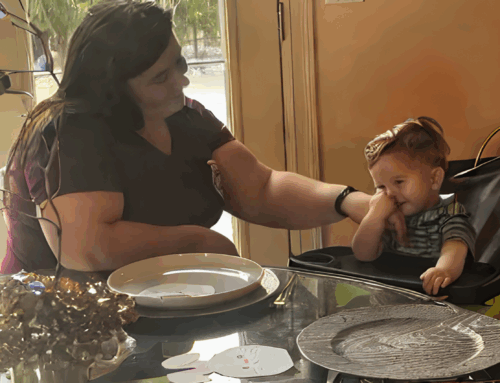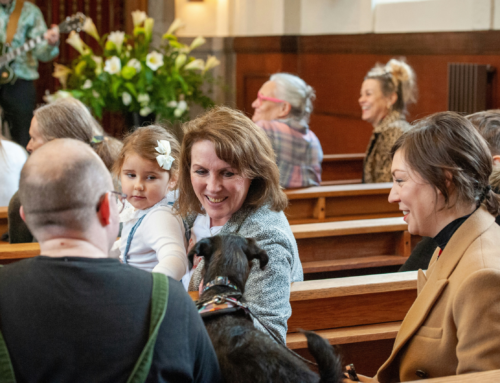I am a Canadian woman who has cerebral palsy. I am a Registered Social Worker as well as a Chaplain. Under normal circumstances I lead a very active life which includes professional responsibilities, being an active member of my faith community and maintaining volunteer commitments in the community at large.
I am usually visited by a Personal Care Attendant four times daily, but other than that I live independently, using public transit, attending to activities of daily living such as banking and grocery shopping on my own.
Most of my Personal-Care Attendants travel to and from my house via public transit. Unfortunately, I am not in a financial position to be able to afford shuttle services or taxis for my Personal Care Attendants to avoid public transit as some larger organizations have done as a precaution. Since the COVID-19 crisis hit Ontario I have reduced the frequency of support I receive, even though I rely on Personal Care Attendants for essential tasks like using the washroom, because I cannot verify that they have not been exposed to the virus.
I am terrified of getting COVID-19, and taking every precaution that I can because I know that if I contracted the virus, my life and the lives of all those who cared for me prior to my exhibiting symptoms would be at risk. Getting support with my personal care in the midst of a quarantine might be impossible and my compromised respiratory system would make it especially difficult for me to survive COVID-19.
In this unprecedented challenging time, I am especially conscious of God’s provision for me. My mother is over 60 years old. At this time in her life she is not working and she has graciously agreed to temporarily move into my house to support me throughout this crisis. She has been sleeping on the floor of my living room, grocery shopping when needed, cooking and cleaning, as well as supporting me in various ways between the hours of 9 am and 10 pm. This arrangement is not sustainable physically or financially over the long-term.
It is especially troubling to realize that regardless of the sacrifices that I, my mother and some Personal Care Attendants are making, we remain at greater risk of contracting COVID-19 than those who can strictly self-isolate and stay home.
Reading various news stories about pandemic ethics and proposed triage protocols that discriminate against people with disabilities is extremely troubling for me because they confirm fears that until now I was only subconsciously aware of.
In this article I first emphasized my educational achievements as well as my societal contributions. This is rooted in my need to prove that my life is just as valuable as a Canadian who does not have a disability, and convince others that regardless of their preconceived notions of disability and quality of life, my quality of life is very high.
I have felt pressured to demonstrate that my life is of equal value to any other Canadian ever since Canada’s Medical Assistance in Dying legislation came into effect. So-called pandemic ethics and fears of scarcity have the potential to devalue the lives of Canadians with disabilities, and others with disabilities around the world even further. While in some ways the COVID-19 pandemic is unifying the community around the globe, in others it is legitimating archaic values and hierarchies.
The value of someone’s life is not dependent on whether they have a disability. It is shocking to me that there are people in this world, medical ethicists in fact, who need to be convinced of this. Withholding potentially life-saving treatment from people with disabilities is discriminatory and wrong.
I am apprehensive about publishing this next point in case it may be viewed as legitimating pandemic ethics, but my aim is to be fully honest so with that disclaimer I will share my heart. It saddens me and hurts me but I am especially ashamed because I cannot think of triage criteria that would be any more or less ethical. I do not think it is acceptable to value any life over another but I do not think first come first serve should qualify as acceptable criteria for the distribution of potentially life-saving technology either. We must all acknowledge that this is a complex situation, and one that requires wisdom and faith as we navigate the path forward together.
In the event that I contract COVID-19, if I am denied lifesaving measures on the basis of anything related to my disability this will represent a gross societal injustice. My consolation will be that I begin to enjoy eternity with Jesus earlier than I had hoped. As a Christian, at this point I will continue praying that I, my loved ones, and all those who care for me stay healthy and safe. I will also pray for medical ethicists to have Godly wisdom and for protection of front-line health care workers.



